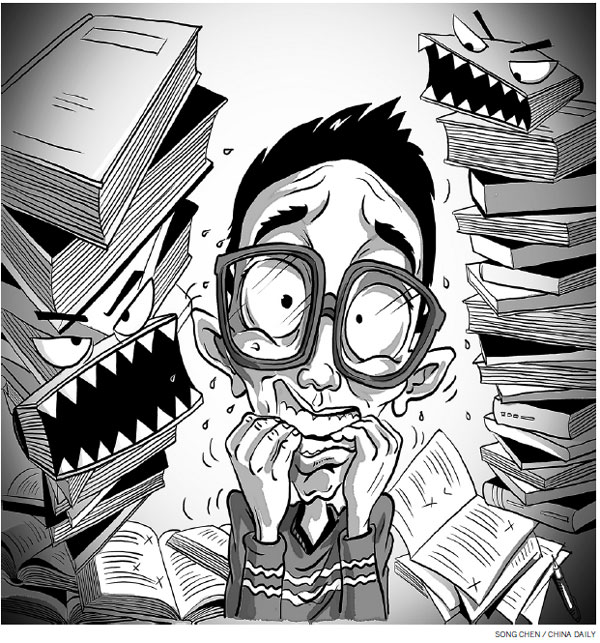Flunking gaokao not end of the world
It's that time of the year again, when about 9 million students will take the gaokao (college entrance examination) seeking the scores that will get them about 7 million undergraduate seats in universities. This is not a contest where all can be winners. Irrespective of how good the students are, about 2 million of them will not be able to enroll in a university. That adds to the huge pressure on the students to get the highest possible marks and get into a university of their choice.
Higher education is an important ladder to social and economic mobility in China, and for children of poorer parents it may be seen as their only chance. Many parents invest money in extra tuition for their children, who are under tremendous pressure not to disappoint their families. Failure, for them, is not an option.
It is thus not surprising that a recent report by the 21st Century Education Research Institute and the Social Sciences Academic Press identified links between examination pressure and suicides of students in China. At all levels, right through to the entry into a university, the scores obtained by students in exams under time constraints dominate their assessment.
It is well recognized that such exams can result in poor performances for some students compared with their abilities and school records. There are many reasons for that: lack of sleep from worry and/or last minute cramming before exams, uncontrollable nerves, ill-health, misreading questions in panic, blanking out - the list can go on.
The Western education system recognizes the importance of continuous assessment as a contributor to overall grades with exams playing a vital but not necessarily the most vital part. It is normal for students in the United Kingdom to go to graduate school based on undergraduate degree performance, without taking an entrance exam. To get into a university, there are alternative study routes from exam-focused "A" levels to national diplomas that contain a lot of coursework in the final results.
Another factor is how the country's education system presents the link between school leaving exams and future options. Most Western countries look at this as measuring what the students achieved in school, for example, the American High School Diploma, not a university entrance exam.
A variety of options follow. Some good high school graduates may go on a gap year before going to university and others make the choice to take foundation degrees at colleges or "AA" degrees at American community colleges, both of which could facilitate their entry into a university later. They can start professional programs or enroll in online courses (popular in the United States), and later in their career join university courses (popular in the UK) or a university in the US as a mature student.
Put simply, not getting into a university at 18 is not the end of the world for students. At the very least, exams can be retaken. A university is not closed off. In the US, although the official length of an undergraduate course is four years, the average time it takes a student to complete it is 5.5 years. Students benefit from a credit system per course, can marry, work part-time and be in the university a bit later in life. It need not happen immediately after school.
But in China, most students aiming to go to a university do see the failure to do so as the end of the world. They feel that it is all or nothing. They feel ashamed when compared with their successful peers. They feel that they have let down their parents.
Society needs to reflect on this attitude, especially when every year 2 million students cannot get into a university. Teachers and parents need to prepare students for other options. Yes, a poor result in gaokao is disappointing but it is the start of an alternative path. The setback can be overcome. More importantly, students must realize that suicide is not a permanent solution to a temporary problem. Parents in particular must make their children feel that they love them regardless of their performance in gaokao and remove the stigma of failure from them.
An increasing number of parents in China are opting for a fairer system by preparing their children for entry into foreign universities, especially in the US, the UK and Australia. These students can thus bypass gaokao. Also, the heads of some Chinese universities have said that they would consider students' school records and head-teacher reports during admission.
Besides, the authorities are planning to reduce the importance of studying English by canceling the language ability test to give students more time to study other subjects. That may ease some pressure from students, especially for those that find the study of a foreign language very challenging. But that does not address the reality - that not all can be winners and society needs to respect those that end up taking a different route. That is the core issue - not getting into a university does not make one a less valuable member of Chinese society.
Remember, two "college dropouts" - the late Steve Jobs and Bill Gates - changed the way we look at the world. And remember, not having a university degree is not the end of the world!
The author, an economist and international educator, is director of China Programs at CAPA International Education, a US/UK based organization that cooperates with Capital Normal University and Shanghai International Studies University.

























